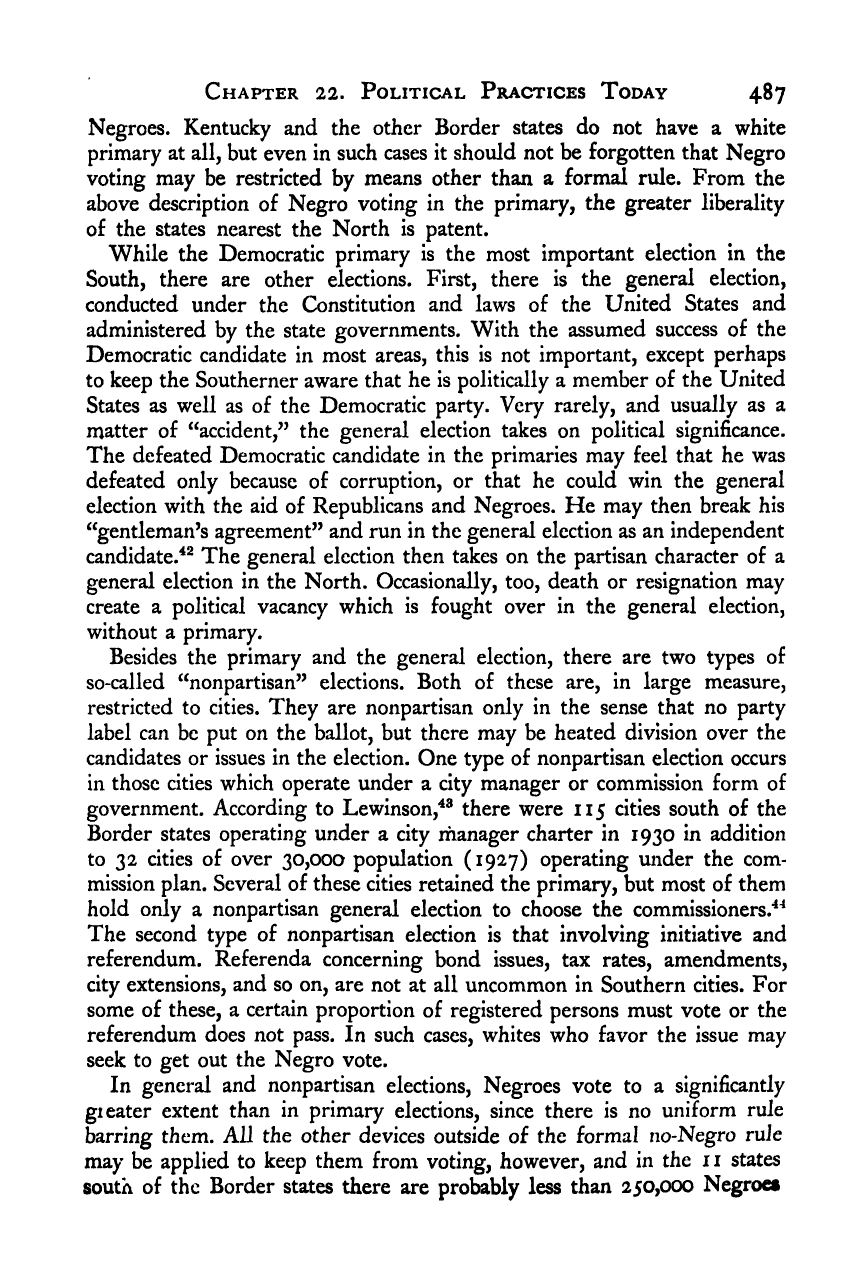Note: Gunnar Myrdal died in 1987, less than 70 years ago. Therefore, this work is protected by copyright, restricting your legal rights to reproduce it. However, you are welcome to view it on screen, as you do now. Read more about copyright.
Full resolution (TIFF) - On this page / på denna sida - V. Politics - 22. Political Practices Today - 3. The Negro Vote in the South

<< prev. page << föreg. sida << >> nästa sida >> next page >>
Below is the raw OCR text
from the above scanned image.
Do you see an error? Proofread the page now!
Här nedan syns maskintolkade texten från faksimilbilden ovan.
Ser du något fel? Korrekturläs sidan nu!
This page has never been proofread. / Denna sida har aldrig korrekturlästs.
Chapter 22. Political Practices Today 487
Negroes. Kentucky and the other Border states do not have a white
primary at all, but even in such cases it should not be forgotten that Negro
voting may be restricted by means other than a formal rule. From the
above description of Negro voting in the primary, the greater liberality
of the states nearest the North is patent.
While the Democratic primary is the most important election in the
South, there are other elections. First, there is the general election,
conducted under the Constitution and laws of the United States and
administered by the state governments. With the assumed success of the
Democratic candidate in most areas, this is not important, except perhaps
to keep the Southerner aware that he is politically a member of the United
States as well as of the Democratic party. Very rarely, and usually as a
matter of “accident,” the general election takes on political significance.
The defeated Democratic candidate in the primaries may feel that he was
defeated only because of corruption, or that he could win the general
election with the aid of Republicans and Negroes. He may then break his
“gentleman’s agreement” and run in the general election as an independent
candidate.^^ The general election then takes on the partisan character of a
general election in the North. Occasionally, too, death or resignation may
create a political vacancy which is fought over in the general election,
without a primary.
Besides the primary and the general election, there are two types of
so-called “nonpartisan” elections. Both of these are, in large measure,
restricted to cities. They are nonpartisan only in the sense that no party
label can be put on the ballot, but there may be heated division over the
candidates or issues in the election. One type of nonpartisan election occurs
in those cities which operate under a city manager or commission form of
government. According to Lewinson,^^ there were 115 cities south of the
Border states operating under a city rhanager charter in 1930 in addition
to 32 cities of over 30,000 population (1927) operating under the com-
mission plan. Several of these cities retained the primary, but most of them
hold only a nonpartisan general election to choose the commissioners.^^
The second type of nonpartisan election is that involving initiative and
referendum. Referenda concerning bond issues, tax rates, amendments,
city extensions, and so on, are not at all uncommon in Southern cities. For
some of these, a certain proportion of registered persons must vote or the
referendum does not pass. In such cases, whites who favor the issue may
seek to get out the Negro vote.
In general and nonpartisan elections, Negroes vote to a significantly
gi eater extent than in primary elections, since there is no uniform rule
barring them. All the other devices outside of the formal no-Negro rule
may be applied to keep them from voting, however, and in the 1 1 states
south of the Border states there are probably less than 250,000 Negroes
<< prev. page << föreg. sida << >> nästa sida >> next page >>